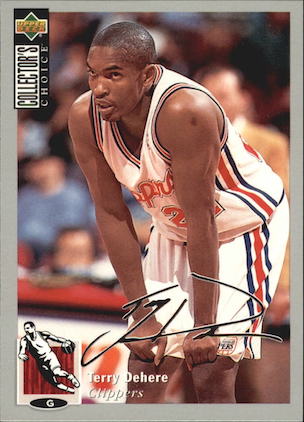
Sport: Basketball
Born: September 12, 1971
Town: Jersey City, New Jersey
Lennox Dominique Dehere was born September 12, 1971 in New York City and grew up in Jersey City. He lived in the Arlington Gardens apartment complex, where his father, Lennox, worked as the super and his mother, Greta, watched him from her kitchen window devote endless hours playing and practicing at the playground courts on Garfield Avenue. Everyone knew him as “Terry.” By the time he enrolled at St. Anthony’s, he was one of the best young players in the city. A whippet-thin guard, Terry would soon earn the nickname “Rubber Band Man.”
Coach Bob Hurley helped Terry become a deadly outside shooter and blended his skills with teammates center Luther Wright, forwards Jerry Walker and Rodrick Rhodes and fellow guard Bobby Hurley—with whom Terry developed a lifelong friendship—to build the finest high-school team in the country. In four years at St. Anthony’s, Terry lost just four games. In 1988–89, his senior year, the team went a perfect 32–0.
The target of multiple big-time recruiters, Terry decided to stay in-state and accepted a scholarship to Seton Hall. Walker also signed with the Pirates, whose program had become a great success under coach PJ Carlesimo. They were later joined by Wright and Bobby coach Hurley’s younger son, Danny.
Terry led the team in scoring as a freshman and was their top gun as a sophomore on the way to a Big East Tournament title. He followed that up with a scoring binge in the 1991 NCAA Tournament that helped Seton Hall reach the regional final. His performance put him on the radar of NBA scouts and got him thinking he might carve out a career at the professional level.
With the graduation of Anthony Avent, Terry became the Pirates’ team leader in 1991–92. He topped the club in scoring for the third straight year and helped them secure another NCAA Tournament bid. Seton Hall advanced to the regional final again, where they met Duke. Terry went head-to-head with Bobby Hurley and held him to just 4 points, but the Blue Devils prevailed, 81–69.
As a senior, Terry led the Hall in scoring again with a career-best 22.2 ppg average—including 41 against St. John’s. Prior to a March game at Byrne Arena, the Pirates took the unprecedented step of retiring his number while he was still an active player. Seton Hall finished first in the Big East and won the conference tournament, defeating Syracuse in the final, 103–70. Terry was named the tourney MVP. His college career ended with a second-round upset in the 1993 NCAA Tournament at the hands of Western Kentucky. He graduated with Big East career records for points and three-pointers and was a first-team all-conference selection three times.
Terry was smallish for an NBA shooting guard at 6’2”, but he was taken by the Clippers with the 13th pick in the 1993 draft. He played primarily as the team’s Sixth Man and averaged in double-figures in 1994–95 and 1995–96. After four seasons in LA, Terry finished his career with the Kings and Grizzlies and then played two years in Germany before calling it a career.
After basketball, Terry focused his attention on his hometown. He purchased a historic restaurant in Jersey City and was elected to the Board of Education. Terry also became chairman of a non-profit group created to build affordable housing. Squabbles with the city prevented the units from being developed. In 2002, Terry was inducted into the Seton Hall University Hall of Fame. Two decades later he was enshrined in the Hudson County Hall of Fame.